In November, PBUK trustee Lucy Hannah visited our projects in Chechnya. Here are some highlights from her visit.
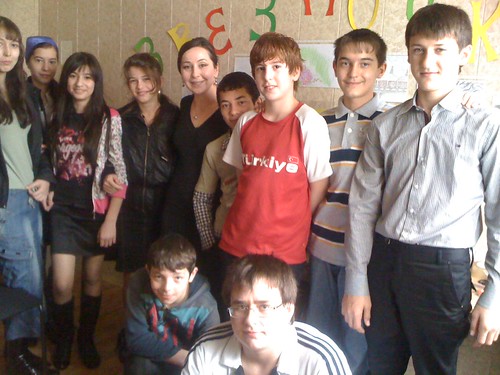
“When there’s no LS seminar I feel sad. This is the place where we play, paint, put pictures on the wall and laugh,” Markha, 10, from the school in the Michurina region.
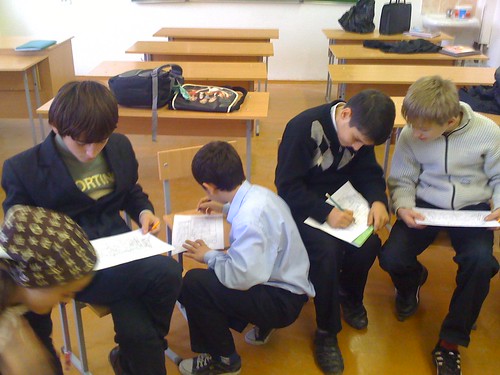
Magomed, 12, has been going to the LS point at School Number 106, for two months: “You’re not allowed to fight here. You have to find other ways to talk to each other. I think now, before I fight with someone.”
The Little Star “points” are classrooms in schools specifically allocated for LS to carry out their sessions. They vary hugely from each other and are all given a distinctive feel by the particular psychologist who is based there. For example, in School Number 18, the LS psychologist, Rashan, has a small room which can hold about nine children. It’s cramped, but cosy and warm. A candle burns in the corner and there’s relaxing music in the background. The children sit in a circle, as they do in all the points. Alie, 14, has just started here, “ I wanted to find out something new about myself. I like the idea of a circle, it’s not like being in a classroom; it helps me to feel different.”
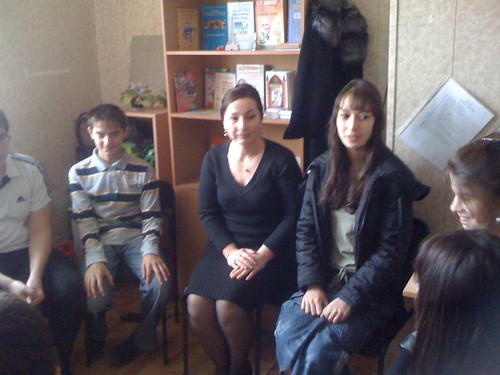
Also in Rashan’s group is Hutmat, 13, “I like what we discuss in the group. I like saying positive things to each other. It’s different from the rest of school.” Marta, 13, came to LS because friends told her about it, “it’s different from the other parts of my life. I feel safer here than at home or anywhere else.”
In addition to the groups, the psychologists hold events which children/young people can attend. They also run intensive ‘closed’ groups, as well as more ‘open’ drop-in groups depending on the needs of their particular school. Raising awareness of substance/alcohol abuse isn’t the main focus of their work but it’s often a theme they incorporate and the group are planning a lecture/event about it to target young people in Grozny.
Psychology students from the university attend the LS points in the summer. They take part in the training and offer their own schedules which they’ve designed for children. At other times of the year, they meet children at the LS points and work with them for a week or a month. “We’re doing the work of employment agencies,” says Aslan. “Many people are trained by LS then work around the country in the same field.”
The LS point in School Number 9 is much larger and more like a traditional classroom. The LS psychologist, Rustam, used to carry out his LS work in a disused building nearby, but the director of the school has now given him one of their new classrooms due to the demand for LS’s services.
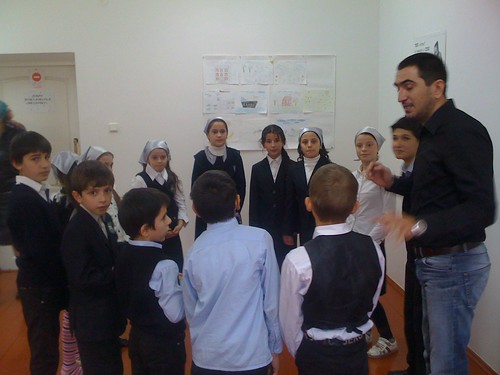
Maga, 11, has been attending for two months, his friends told him about LS: “This is quite different from what I’ve been doing in school. Here, I relax and have fun.”

In Rustam’s group, where the children have been attending for two months, they’re acknowledging their fears and doing an exercise in “throwing them away”.
School Number 106 is in one of the poorest areas of Grozny which suffered heavy bombardment. It’s also close to the River Sunzha, which often floods the area. Here, destroyed houses haven’t been rebuilt. LS psychologist, Aslan, has been given a classroom and an office – a reward from the director of the school for his work with Little Star.
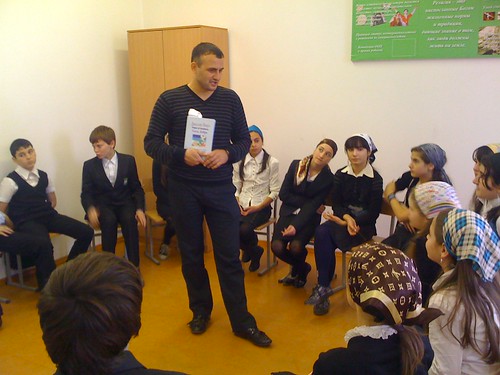
In School No 16, Madina works with 1st– 6th years in a smallish but cosy room. Her group of 6 year olds have an animated discussion about trust. Meanwhile, next to Grozny Zoo, in School Number 54, another LS psychologist, Medina discusses happiness as the day’s topic. The children discuss what happiness is, then draw their own idea of it. The LS point is detached from the main school so “we can make a noise!” says Marta, aged 10. Medina has filled the room with pot plants and pictures. Teacher, Maret, is impressed: “look at these kids. They’ve had four lessons this morning, but as soon as they come in here, they’re energised.”Other recent topics Medina has explored, include: “my mood today” “who I am” what I am” “tolerance” “emotions” and “fears”.
The LS team believe that if the teachers can see the positive results of the process they’re more likely to make time to work alongside the psychologists, reciprocally. Russian language teacher, Zina, from School Number 106, says, “after attending LS, the children study better, they become more interested in the learning process, they’re more polite, and friendly to each other.”
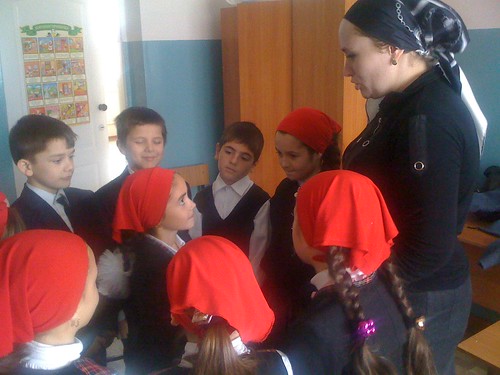
Taharik, a teacher in School Number 16, says “I knew children who’d stopped smiling, but after LS sessions they’d become more open to living again. When Madina isn’t there, they go looking for her.” She agrees that children are more engaged with the learning process after being at LS. “Sometimes a child won’t obey the rest of the class, you can see there’s something going on; they won’t get involved, but it takes a LS psychologist to identify the problem.”
Petimat, another teacher in School Number 16, says, “the children have many problems – we have a huge number of orphans and those from broken families. I’ve had children who just cower in the corridor when they arrive. In the first year, aged 6 and a half, there are 150 children, but LS can’t cover them all and even if they could, we’d have to find a way of fitting it round the curriculum. We can take the children out of music class, for example, but nothing else. We end up referring the most problematic ones – the ones who’re crying in class all the time.”
The psychologists say, it’s simpler to liaise with the teachers because you’re in school and you’re both working with the children, but it’s harder to contact the parents; they only tend to come if there’s a serious issue.
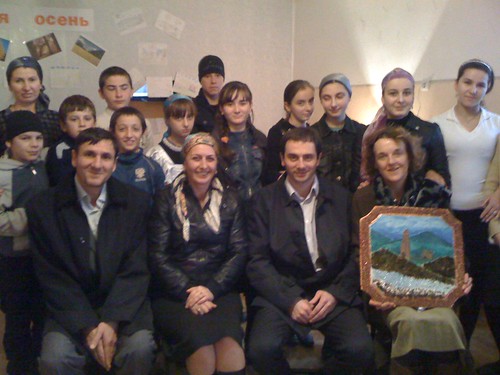
Here in Michurina, LS psychologist, Aishat, works with every class in the school and the director also gets involved because the school is so small: “LS helps to discover creative talents in an informal environment. I don’t have much space available here, but I want to give it to LS,” he says.
The psychologists always try to attend parent’s meetings at the school as this is the only way to really get to see them. Aslan explains, “Often, the parents don’t care enough to get information from their child and it’s obvious they’re neglecting them. We have to make up for that. I always attend parent’s meetings. This job is about building relationships with directors, teachers, children, and of course parents.”
